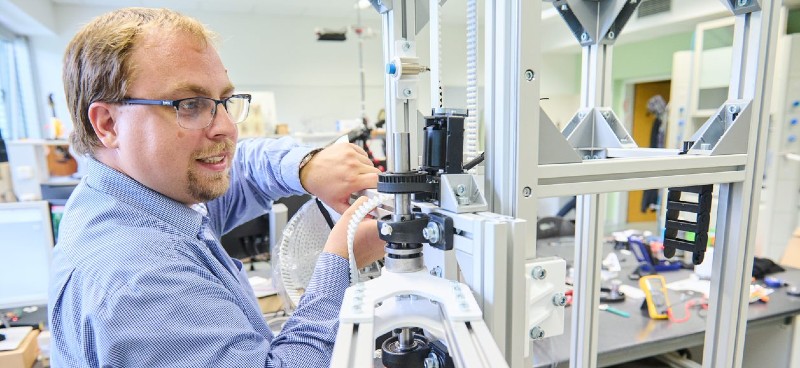
BERABOT – Robot Protecting Tomatoes Is Being Developed at TBU
9. August 2021A unique monitoring system designed to protect tomatoes and entitled BERABOT (BE – Bezdínek, RA – rajčata (tomatoes in Czech), BOT – robot) is being implemented in the laboratories of TBU by a team of scientists from the Department of Informatics and Artificial Intelligence of the Faculty of Applied Informatics in collaboration with the NWT Group and the Bezdínek Organic Farm in Dolní Lutyně. The robot is programmed to carefully check each and every tomato in huge greenhouses, evaluate the result of the production and, at the same time, detect any plant pests in time.
The structural framework of the robot has been completed recently in the TBU laboratories by scientists, data analysts, designers, agronomists and phytosanitary experts. It was very difficult to assemble.
“It must be very resistant to the conditions in the greenhouse and must be able to withstand the conditions 24 hours a day. It is necessary that the construction is robust and allows camera tracking to take place with millimetre accuracy,” explained Prof. Mgr. Roman Jašek, Ph.D., Principal Investigator of the project and Head of the Department of Informatics and Artificial Intelligence.
The intelligent robotic system equipped with a camera system will move around the greenhouse between rows of tomatoes and analyse all of the plants carefully and in detail. In addition to providing the required hardware, scientists are also tasked with delivering artificial intelligence so as to ensure that the robot can think and see in a way similar to a human. “A human does everything automatically, but here human thought has been replaced by the use of artificial neural networks. A computer is used to simulate neurons in the human brain and assemble them into a complex structure of deep networks. Instead of human eyes, our Berabot uses state-of-the-art machine vision algorithms that we develop,” adds Ing. Peter Janků, Ph.D., member of the development team at the FAI.
Such an enormous task cannot be performed without international scientific cooperation, namely with experts from the University of Tokyo. By participating in this project, Tomas Bata University has joined the group of elite international research units. “Consultations on the robotic part of the project were held directly at the University of Tokyo, namely at the workplace of Prof. Wei Guo. Colleagues from Japan also participated in a research fellowship at our Faculty and highly appreciated creativity, multidisciplinarity and systemic approach to tackling complex scientific and engineering tasks,” says Prof. Jašek.
By using virtual reality and artificial intelligence, plant pathologists at the Bezdínek Farm will manage to save time and money necessary for checking of the individual plants. The system that is being developed can detect pests such as whiteflies or leaf-miner flies which attack the leaves. It also detects mould as well as a lack of nutrients or water.
“At NWT, we have always put emphasis on the interconnection between various areas of activity. The BERABOT project is a great example of it. The modern farming technique used to produce vegetables at the Bezdínek Farm will be combined with the latest information technology during the implementation of the project. Moreover, thanks to the involvement of Tomas Bata University, we have managed to interconnect the private sector with the academic world,” says Ing. Vít Štěpánek, Head Manager of Sales ICT, which is a component part of the NWT, about the project.
The researchers will continue to work on the development of this system over the next four years. The project has ambitions to offer the BERABOT system for sale abroad and, thus, to put a fully competitive and innovative product on the European market. The project has been co-funded by the Technology Agency of the Czech Republic.